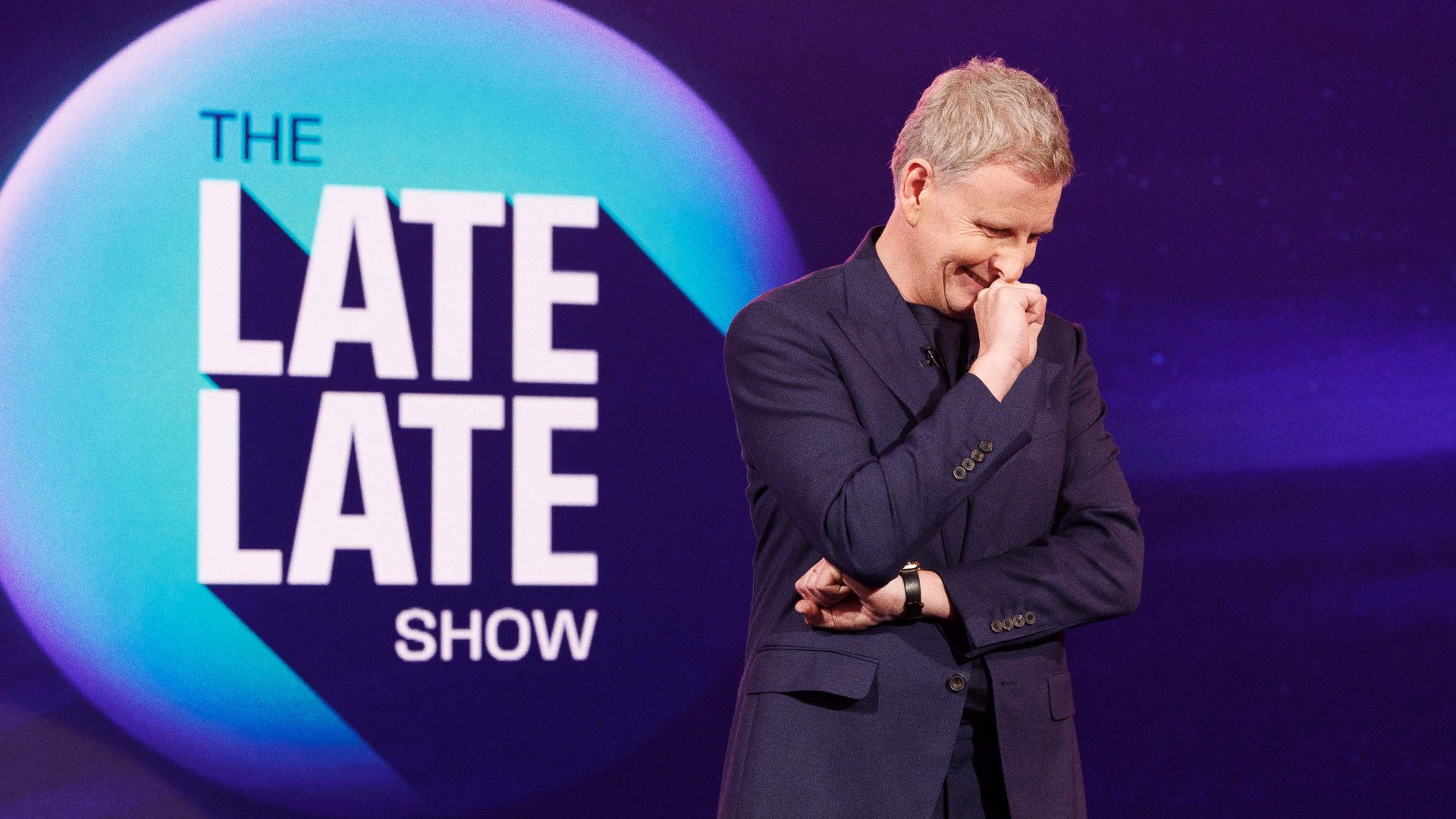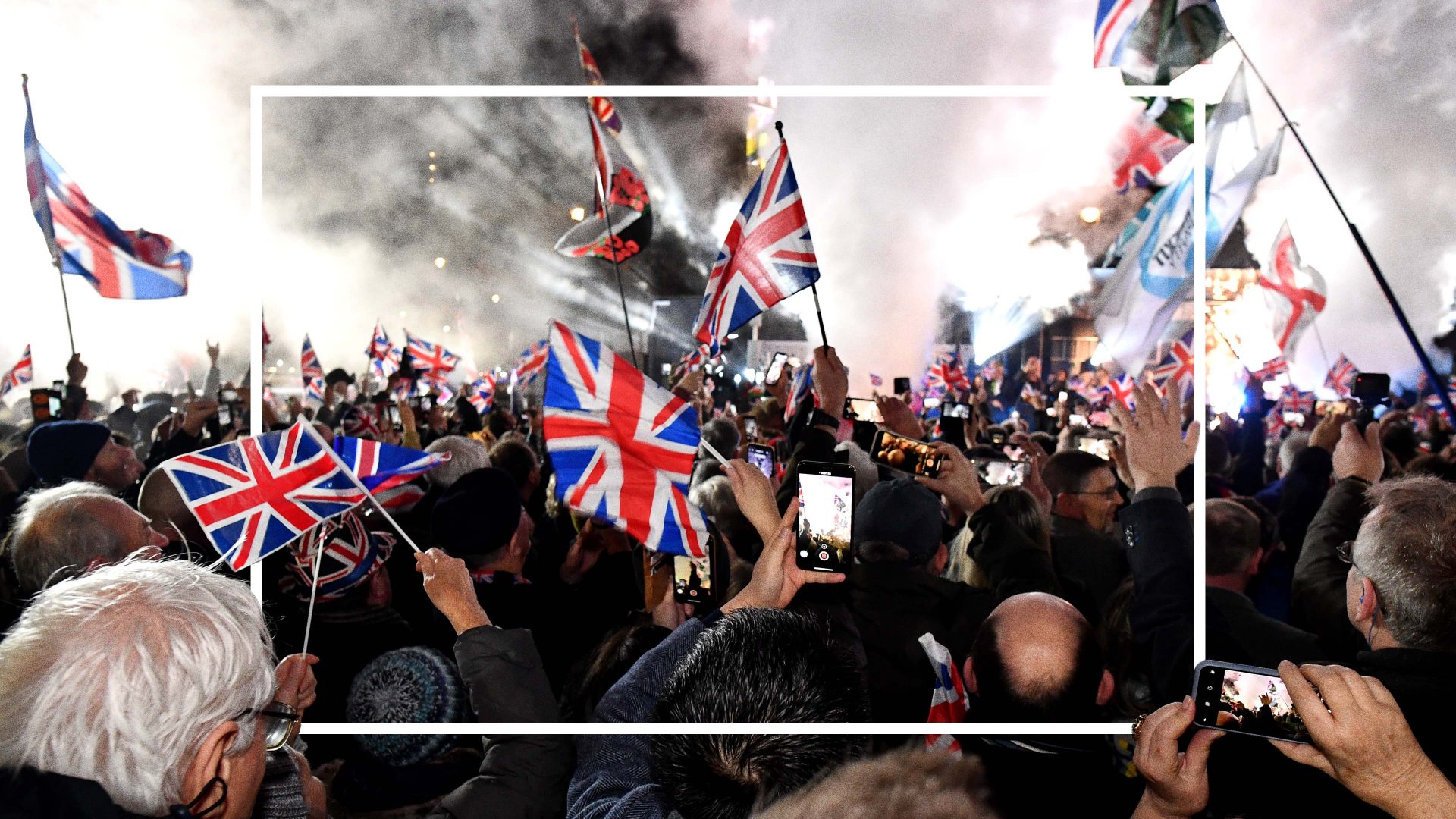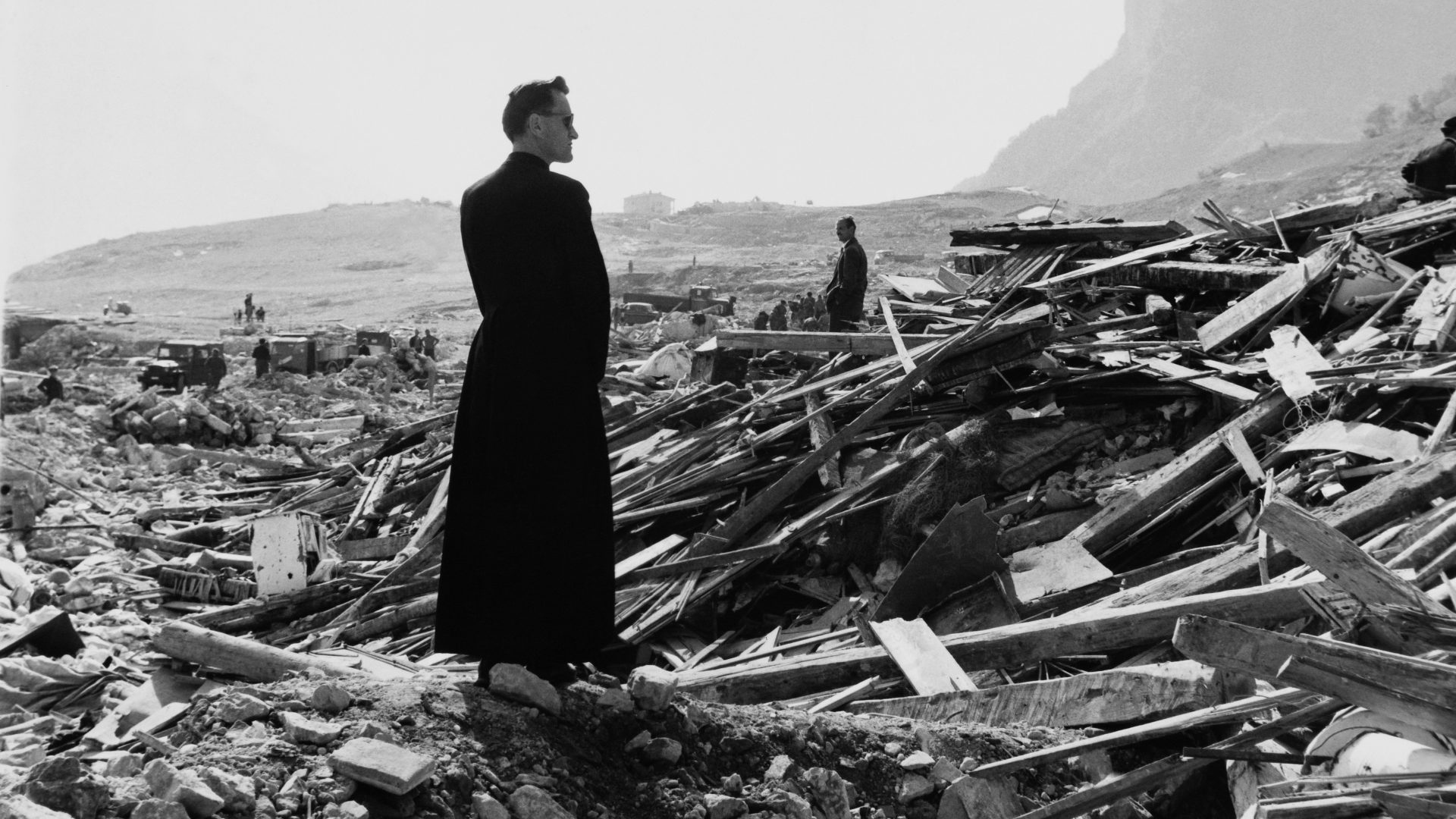For a stand-up comedian, Patrick Kielty has long been expected to do much political heavy lifting. His debut on RTÉ’s iconic The Late, Late Show was no different.
Never mind questions about how he would slip into the chair of an institution that has been broadcasting since 1962, with Gay Byrne hosting from the start until 1999, and is watched on both sides of the border. What people really wanted to know was: how would the first Northern Irish presenter in the show’s history fare with the Republic’s viewers? How would he handle the scandal engulfing the Irish state broadcaster over secret payments to his predecessor, Ryan Tubridy? And given the febrile post-Brexit political fallout, could he promote better understanding between nationalism and unionism – and even between both parts of the island?
Kielty used his considerable comedic skills to address the RTÉ controversy head-on, starting the show with gags about the £300,000 paid to Tubridy. But it is that opening monologue’s final moments, when his voice cracked with emotion, that will stay in the memory. The 52-year-old briefly addressed Ireland’s turbulent history and the complexities of identity, as well as obliquely referencing how he had suffered personally with the murder of his father.
He told how “before the border was drawn on this island, my grandfather Kielty moved up from Wexford”, how his mother was tuning in at home in Northern Ireland, and how his two sons with his English wife, TV presenter Cat Deeley, were watching in London, where he lives. His own journey, he said, “has had the odd bump in the road” – quite the euphemism for being called to the headmaster’s office in January 1988 when he was 16 to be told that his father, Jack a 44-year-old building contractor, had been shot dead by the loyalist UFF.
Kielty isn’t just another slick, post-modern TV presenter. His lived experiences and thoughtful reflections have made him a powerful contributor to the conversation about a shared island future. In compelling documentaries, he has talked about voting uneasily for the 1997 Good Friday Agreement (GFA), which meant amnesty for those convicted of his father’s murder. He has spoken to young loyalists about why a new trade border in the Irish Sea led to violent protests and investigated whether a united Ireland is really any closer.
This is important now, because there are disturbing signs that both traditional camps are sliding back into their divisive ways and toxic rhetoric.
The UK’s vote to leave the EU in 2016 has prompted repeated calls for a border poll, and raised tensions. In the years of relative peace since the GFA, politicians have squandered opportunities to initiate reconciliation or address legacy, including justice.
Sectarianism regularly makes headlines. Sectarian set-pieces have become annual dates like Easter or Mother’s Day, marked by a media cycle of outrage followed by condemnation. Every July, nationalist politicians’ election posters burn on loyalist bonfires. Every August, thousands of festivalgoers at Féile an Phobail in Belfast chant “Ooh Ah, Up the ’RA”.
Ironically, despite the talk of a united Ireland, relationships are fractious, not just between nationalist and unionist communities in Northern Ireland but, strikingly, between “northerners” and “southerners”.
Kielty, too, has found his Irish credentials under scrutiny, which may be why he namechecked his Wexford-born grandfather. Dismay surfaced on social media when the Late, Late gig went to a northerner. That he had an English wife and would commute from London caused consternation.
That sense that he was not properly “one of us” was doubtless fuelled earlier this year on RTÉ’s Tommy Tiernan Show when, from a nationalist background, Kielty spoke up on behalf of unionists. A united Ireland would mean “changing some furniture” to make “nearly a million unionists up the road… feel welcome”. He explained why unionists were offended when the Ireland Women’s Football Team sang the Ooh Ah song: “If you saw the Northern Ireland Ladies team up there singing ‘they’re up to their necks in Fenian blood’ and singing The Sash, you’d sit there and think to yourself ‘Jeez, I’m not sure about that’.”
Unionists objected when US congressman Richard Neal used the term “planter” when visiting Dublin last year, resenting its implication that they were not properly Irish and at home despite their forebears having lived on the island for centuries.
The poet Stephen Connolly spoke out recently about experiencing anti-northern sentiment when asked to programme Listowel Writers’ Week in Co Kerry. When he was introduced as the new curator from Belfast, one man piped up: “Could they not have got anyone Irish to do it?” There was, he said, “a lot of this kind of vitriol, veiled or unveiled, about being from the north”. One journalist explained the restructuring that had put Connolly in the post “in terms that you can understand… [it’s] the same as gerrymandering”.
Northern Ireland now feels febrile. John Caldwell, the Police Service of Northern Ireland’s detective chief inspector, narrowly survived a dissident republican murder bid in February. A PSNI raid targeting the New IRA this month netted firearms, military grenades and plastic explosives.
Policing itself is in crisis. PSNI chief constable Simon Byrne finally resigned following a catastrophic data breach that has jeopardised the safety of 10,000 officers and civilian workers, and a high court ruling that he had unlawfully disciplined two junior officers after an incident at a Troubles commemoration event. Rank-and-file officers are demoralised.
Meanwhile, Stormont has been suspended for 19 months since the DUP first minister resigned in protest at the implementation of the Northern Ireland Protocol. In a population of under two million people, 416,022 people languish on health waiting lists. Lough Neagh, the largest lake in the UK and Ireland, is suffering an environmental disaster. Infrastructure is in chronic disrepair.
The DUP needs to find a way back to Stormont, but strategic blunders have left it trying to present a return to the power-sharing executive under a Sinn Féin first minister as a “win”.
The Windsor Framework, which was supposed to have settled the protocol argument in ways unionists could claim precisely as that win, appears not to have worked. Yet another poll approaches next year – a UK general election – that promises to return a government hostile to unionism for the first time in almost 20 years, in the form of the Labour Party.
The tactical failure of the DUP to make friends among the chattering classes in Britain after almost 50 years of representation at Westminster is matched only by the absence of allies in Brussels among the right and centre right after a long presence there which Brexit abruptly terminated.
Taoiseach Leo Varadkar’s assertion that he believed “there will be a united Ireland in my lifetime”, which he doubled down on at the Belfast launch of Peace Plus, the EU’s £858m funding scheme, was branded by NI secretary of state Chris Heaton-Harris as “unhelpful” when it came to ending the DUP boycott.
Varadkar’s remarks may have been more to do with domestic politics in the south, but did nothing to calm unionist nerves, just as his clunky comments about how a nation was judged by “the way it treats its minorities” – in this case one million Protestants – only highlight how “different” they are. A people apart.
Polls declare that the looming general election in the south next year is certain to oust the two-party centre-right hegemony of Fianna Fáil and Fine Gael and return a Sinn Fein government for the first time in that state’s history. With the suspension of the assembly and the perceived inertia of the unionist leadership as nationalism sets the agenda, the sense of the sands running out for the old order intensifies.
Yet those with long experience of northern politics know there are no easy answers – as recent interventions by two veterans illustrated.
Derry civil rights campaigner Eamonn McCann, now 80, told the BBC: “Constitutional change is not something I’m passionate about. If constitutional change doesn’t mean change… on the ground for people’s day-to-day lives, then I’m not sure what the point of it can be.”
Wallace Thompson, a founding member of the DUP who is now 70, felt secure enough in his British identity to assert in the Belfast Telegraph that he “was born an Irishman. And people in my community again say ‘oh no, no, no, we aren’t Irish’ – but we are Irishmen and it’s nonsense to believe we’re not. We need to rediscover some of that Irishness… A hundred years ago, our forefathers were happy… to be seen to be Irish.”
Notably, he also said there “was an inevitability” of a move “towards some form of new Ireland… Hopefully new and not absorption”, and cautioned unionism against being in “constant denial”. But he also feared losing his British identity in a united Ireland.
As Kielty explained to Tommy Tiernan, building a shared island requires compromise and understanding on all sides. Any constitutional change would require unionist buy-in yet there is little indication of nationalism reaching out to its unionist neighbours.
There have been no think pieces about constitutional, civic, military, welfare or even administrative reform to accommodate a new population. The future “British-identifying” minority – who will not all be Protestant – will have to fit themselves in alongside those migrating from the Balkans, north Africa or Ukraine. That unionists may need to be persuaded about the merits of a new Ireland and their role in it with practical reform of the existing state seems not to have occurred to anyone.
But that isn’t in the DNA of any nationalism really. Regional parliaments? A joint British-Irish passport? Curriculum alignment? A new national anthem? Irish police quotas to ensure fair representation of all communities?
The two main failures of unionism are its inability to see how its future is uniquely tied to a successful executive; and its lack of interest in broadening the unionist argument to appeal to a constituency it knows is there – those who are not natural unionists but who have come to depend on the security and familiarity of the UK. Many of those are from nationalist backgrounds and now citing a new “Northern Irish” identity in the census.
This is where being equally comfortable in the UK and Ireland is a contemporary and modern experience – one not only useful given the breach with the EU, but absolutely necessary to a full sense of identity.
Ahead of Kielty’s debut, Shane Coleman, a presenter on Ireland’s Newstalk station, said: “My concern would be, will he get Ireland? He’s been away for a very long period of time – pretty much his whole adult life. Does he get the country? Will he get its nuances?”
The answer to that is that few “get Ireland” north and south better than Kielty, who has first-hand experience of the very best and very worst of it.




